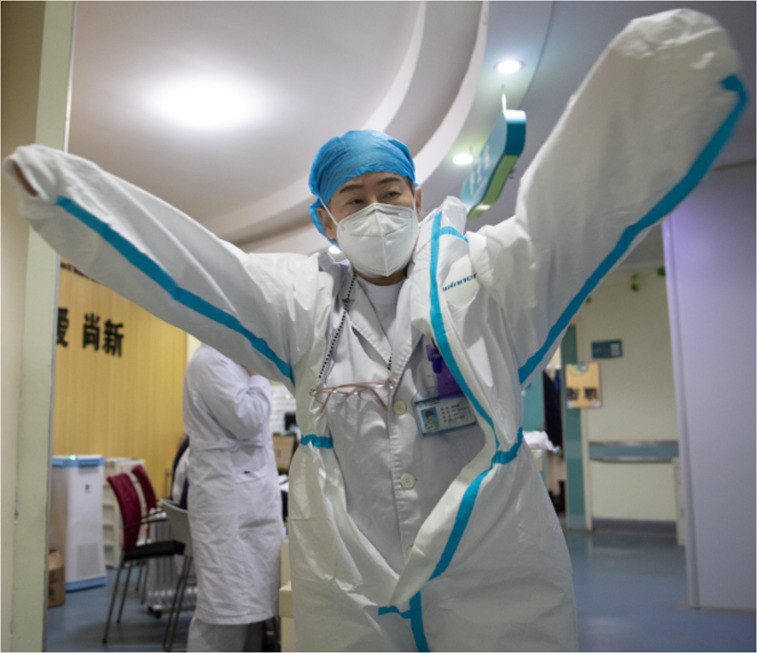In response to the article “Dr. Li Wenliang and the Time of COVID-19,” this piece highlights the crucial role of Dr. Zhang Jixian in the early detection and reporting of the novel coronavirus outbreak in Wuhan, China. While Dr. Li Wenliang is recognized for raising early warnings, Dr. Zhang was arguably the first physician to officially report the emergence of this new and dangerous virus.
Dr. Zhang Jixian, a director of the respiratory and critical care medicine department, demonstrated exceptional vigilance and expertise when faced with a cluster of unusual pneumonia cases in late December 2019. On December 26, 2019, a senior couple presented to Dr. Zhang with fever and cough. Examining their CT thorax images, Dr. Zhang noticed patterns unlike typical viral pneumonia. Her experience during the 2003 SARS epidemic, where she was involved in investigating suspected cases in Wuhan, heightened her awareness of potential epidemic threats.
 Dr. Zhang Jixian in protective suit during COVID-19 outbreak
Dr. Zhang Jixian in protective suit during COVID-19 outbreak
Alt text: Dr. Zhang Jixian, head of respiratory medicine at Hubei Provincial Hospital, wearing protective gear in Wuhan during the COVID-19 pandemic, showcasing her dedication as the first doctor to report the virus.
Driven by concern, Dr. Zhang requested a CT scan for the couple’s son, who presented with similar, though perhaps milder, symptoms. The son’s scan confirmed Dr. Zhang’s suspicions, revealing the same abnormal lung patterns observed in his parents. Adding to the evidence, another patient from the local seafood market arrived on December 27 with fever, cough, and identical CT scan findings. Blood tests for all four patients indicated viral infections, but ruled out influenza.
Recognizing the unusual nature of this family cluster and the market patient, Dr. Zhang stated, “Usually, a family comes to the hospital and there is little chance for all the family members to have the same disease except for infectious diseases.” This astute observation, coupled with her clinical experience, led her to promptly report the situation to the hospital administration on December 27. The hospital, in turn, escalated the report to the Center for Disease Control (CDC) in the Jianghan district of Wuhan on the same day.
Even with limited knowledge about the novel virus at that time, Dr. Zhang took immediate action. She established an isolation area within her department’s ward to hospitalize the initial four patients. Prioritizing the safety of her team, she mandated strict self-protection measures for all medical staff in the ward. Epidemiologic investigations and further testing were rapidly initiated by the CDC following Dr. Zhang’s report.
Within two days, the hospital saw an increase in similar cases, and Dr. Zhang continued to update the hospital administration. Notably, before any expert groups from the CDC were actively involved, Dr. Zhang proactively established a 9-bed isolation ward and implemented isolation protocols. Demonstrating resourcefulness, she even procured 30 pieces of canvas to serve as protective clothing, recognizing the urgency and potential delays in official supply chains. “If it is delivered uniformly by the hospital, it needs to be customized,” she explained, “if it is online shopping, they can receive the goods very quickly.”
The hospital leadership acted swiftly upon Dr. Zhang’s reports. By 1:00 pm on December 29, the hospital’s vice president directly informed the disease control departments of both the provincial and municipal Health Commissions. Despite December 29 being a non-working day, these departments responded immediately, initiating a formal epidemiologic investigation at the hospital.
The Wuhan Municipal Health and Health Commission issued the first official public notice at 3:10 pm on December 30, titled “emergency notice on reporting the treatment of pneumonia of unknown causes.” The urgency of the situation prompted the National Health Commission (NHC) to dispatch a working group and expert team to Wuhan in the early hours of December 31 to guide the epidemic response and conduct on-site investigations.
Dr. Zhang Jixian’s contributions extended beyond the initial alarm. She became a leader in the hospital’s early response efforts, prioritizing patient care and public health. Remarkably, by February, none of Dr. Zhang’s team had been infected, even amidst the severe outbreak in Wuhan – a testament to her effective infection control measures. In recognition of her exemplary service, the Hubei provincial government honored Dr. Zhang in February, acknowledging her as “the first to report the epidemic in the province” and praising her leadership throughout the hospital’s fight against COVID-19. In her characteristic humility, Dr. Zhang downplayed the accolades, stating, “I was just doing what a doctor was supposed to do, driven by professionalism.”
In conclusion, while both Dr. Zhang Jixian and Dr. Li Wenliang played vital roles in the early stages of the COVID-19 pandemic, Dr. Zhang’s proactive clinical observations, rapid reporting, and immediate implementation of infection control measures position her as the first doctor to officially report the novel coronavirus outbreak. Both doctors, along with countless healthcare workers in China and worldwide, have demonstrated extraordinary dedication and courage in the face of this global health crisis, embodying the spirit of unity, patriotism, and selfless service. Their efforts deserve our deepest respect and remembrance.

